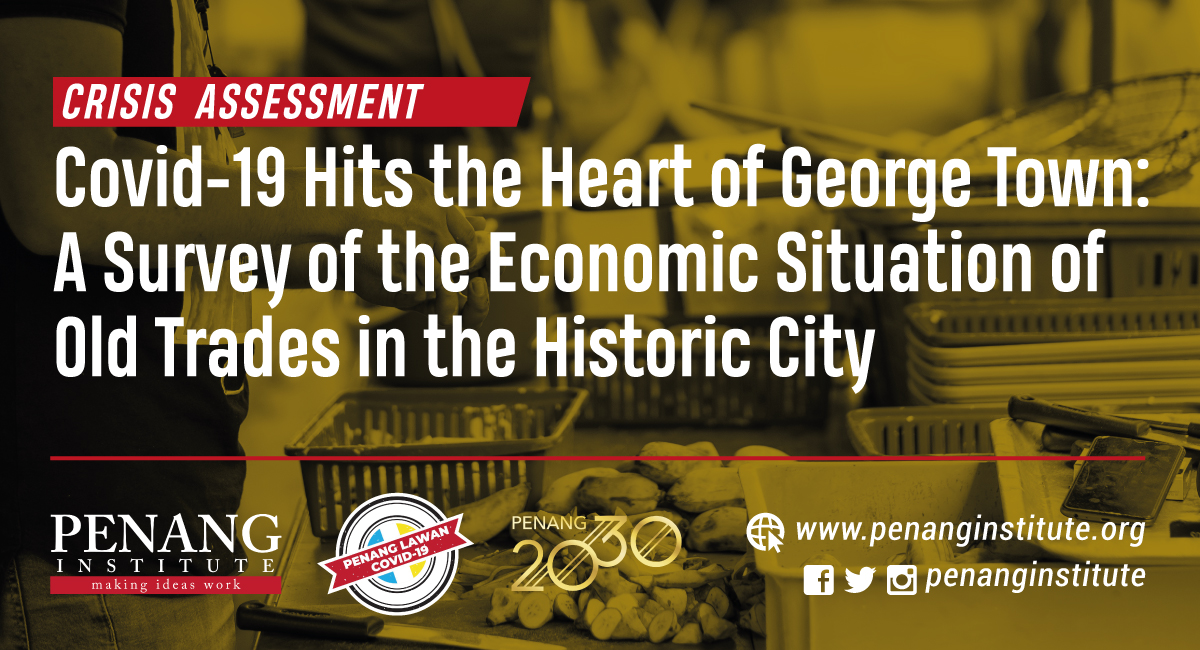EXECUTIVE SUMMARY
- In order to better understand the present economic situation of traditional trades and occupations in George Town, Penang Institute carried out a survey involving 14 traditional trades in George Town, which have been established for at least 50 years.
- Of the 14 interviewees, 12 share that Covid-19 has had an unprecedented impact upon them. The remaining two, admittedly unaware of the difficulties faced by previous generations, claim that Covid-19 is the worst hit that they have taken during their time managing the business.
- Most traditional businesses have yet to consider switching marketing strategies or finding solutions for their businesses in the “new normal”. This is partly due to the fact that most of these businesses are managed by a single individual; and besides feeling out of their depth when it comes to marketing matters, they clearly have too much on their plate to even begin focusing on long-term issues. In a time of crisis therefore, they tend to be more conservative, and some are even thinking of closing down their business or switching to other industries to make a living.
- We visited two traditional performing troupes – Beng Geok Hong Puppet Theatre Troupe, and Teochew Puppet and Opera House. Unlike the situation of other old trades and occupations, the activities of these troupes follow the Lunar Festivals, which mostly occur in the second half of the year. The cancellation of the Hungry Ghost Festival, for example, affects such businesses deeply since they rely on earning the majority of their annual income from such seasonal events.
- Means that we can suggest to help in the evolution and survival of these traditional businesses, based on what the survey has taught us include the following:
1. Move the sale of goods and merchandise online;
2. Explore alternative solutions for services online or in person;
3. Diversify business operations;
4. State integration.
INTRODUCTION
George Town is widely recognised for its tangible and intangible cultural heritage, especially since its inscription as a UNESCO World Heritage site in 2008. From then on, public opinion and debate on the preservation of its heritage buildings, streetscape and artefacts have also significantly increased. The pervasiveness of its traditional port ecology has been undeniable, and the core development of George Town aims at making it a “Dynamic Historic Living City”.[1] The old trades and occupations have been gradually disappearing due to declining demand, and some of these traditional businesses have been catering to tourism in the past decade to sustain themselves. When the Covid-19 pandemic arrived and the Movement Control Order (MCO) was implemented, many businesses – the old trades industry included – and most of them already struggling to survive, suffered losses that they could hardly afford.
To better understand the present situation of George Town’s traditional trades and occupations, Penang Institute carried out a survey involving interviewees representing 14 old trades and occupations that have been established in George Town for more than 50 years. Seven of these are artisans and repairers, three are food suppliers (including a bakery and a restaurant), one is medical hall, one a money changer and two are traditional performing troupes. This survey does not reflect the entire rich traditional industries of George Town; but nevertheless provides insights into some of the problems and challenges faced by these established traditional industries.
UNPRECEDENTED CHALLENGES
Four of the 14 enterprises came into being over a one century ago, eight between 70-99 years ago, and the remaining two between 50-69 years ago. The oldest establishment included in the survey was founded 145 years ago, while the youngest is 52 years old. Some of these trades have been in operation for more than 4 generations.
Of the 14 interviewees, 12 say that Covid-19 has had an unprecedented impact upon them. The other two, no doubt admitting a lack of knowledge about the difficulties faced by previous generations, claim that Covid-19 is the worst hit they had ever taken during their time managing the business.
Mr. Lee Beng Chuan, a joss-stick maker who has been making incense for over 80 years, is 94 years old. He says that despite his age, he had never encountered a situation such the one he had to endure under the MCO, when he was totally unable to operate his business. As the economy grew worse, people began to reduce unnecessary expenditures, and the business of selling ritual supplies in turn became more difficult. In addition, the cancellation of mass praying ceremonies such as the Tomb-Sweeping Festival (“Qing Ming”) and the Hungry Ghost Festival, as well as the fact that tourist numbers have dwindled to almost nothing due to the travel restrictions, have added great strain to Mr. Lee’s business. “It will take time for the business to recover to its original state. Or it may not be possible to recover at all,” he lamented.
Malaysia has no doubt over the years faced various challenges such as the economic crisis in 1986-1988, the ringgit depreciation in 1988-1989 and the 2008 global financial crisis, but nothing has hit the tourism industry as severely as Covid-19 has. Some sectors which are heavily reliant on the tourism industry, such as money changers, were severely affected. One of our interviewees, a money changer, was worried that he will not be able to pass on his business to his son, just as his ancestors had done for him.
Trishaws in Penang were also unable to operate. Mr. Choo Yew Choon, the fourth generation in a tricycle-making and repairing business, has seen his stream of income dry up. For artisans, opportunities have still been available for those who repair items such as furniture, bags, mechanical parts and others, but those who cater to tourists by selling trinkets, souvenirs and accessories now find themselves in dire straits. This has forced them to reconsider seriously the future direction of their business.
Nine of the interviewees had zero income during the movement restriction period. Two of them suffered declining revenue, surviving thanks to being classified among the essential businesses allowed to operate during the MCO. The loss for these two was not unsubstantial; the income for both dropped by 30-60%, due to reduced walk-in customers. In order to reduce expenses and to keep to safety regulations for the safety of both the customers and themselves, both businesses decided to only operate on a half-day basis.
At the time of writing (15 June 2020), most industries have resumed business, but unfortunately, the old trades and occupations of George Town are still earning far less than in the past. Even during the Eid holiday, the public’s spending power was clearly at an all-time low. The owner of Hong Kong Shoe Maker, Mr Wong Heng Mun, said that in the past, handmade shoes sold like hotcakes during the festival, but now, he could only rely on income from repairing shoes to provide for his family. He worries that in the long term, he may not be able to afford the rental fee for his shop, which is at more than RM 2,000 per month.
Among the interviewees, only an old bakery attempted to use online platforms and services to sell their products. Their business unfortunately took a bad hit when it was decided by the health authorities that the Hungry Ghost Festival – a traditional praying festival for the Chinese community – was to be cancelled for the year; the bakery produces traditional biscuits which are used as sacrificial offerings during the occasion. Also, customers who had initially ordered traditional biscuits as wedding souvenirs decided to postpone their wedding to a more suitable date further down the road. For them, the sales online did not make much of a contribution, but it was better than nothing.
Most traditional businesses have yet to consider switching their marketing strategies or finding solutions for their businesses in the “new normal” – partly due to the fact that most of these businesses are handled by only a single individual. And that person has been very busy. In addition to the fact that most of them feel out of their depth when it comes to dealing with marketing issues, they clearly have too much on their plate for now to bother focusing on anything long term. Therefore, in this time of crisis, they tend to be more conservative, and some are even thinking of closing down their business or switching to other ways of making a living.
Mr. Ng Chai Tiam, who has been operating Tian Hua Arts & Antique for 52 years, believes that if he had someone to help promote his works by publishing books or videos, he should be able to sustain his craftsmanship for a while yet.
Out of the 14 interviewees, eight have not considered or not yet found a solution to solve their problems. The thought of online marketing has definitely crossed their minds, but they eventually give up on that as the necessary delivery service would require additional costs and technical support, the management of which they are not familiar with.
For example, the customers of Kedai Songkok OSM Mohd Shariff usually head directly to the store to measure head size for their hear gear. In such a case, moving their business online would mean that they must first guide their customers through videos to provide an accurate size of their head for songkok making. This can be quite a hassle to manage alongside the handling of their day-to-day operations.
We visited two traditional performing troupes, namely Beng Geok Hong Puppet Theatre Troupe, and Teochew Puppet and Opera House. Unlike other old trades and occupations, their activities follow the Lunar Festivals, which mostly occur in the second half of the year. The official decision to cancel the Hungry Ghost Festival this year hits most badly businesses like theirs which earn the majority of their annual income seasonally.
These performing troupes have also lost the opportunity to perform in temples in other states since interstate travel restriction was enforced during the MCO. Madame Ooi See Han from Beng Geok Hong Puppet Theatre Troupe said that they had been performing annually at the festival in Teluk Intan temple for three consecutive generations, but it may not be the case this year.
HELPING TRADITIONAL BUSINESSES EVOLVE
The old trades of George Town are a legacy of the free port status that defined it until the 1960s, and are characterised by its diversity. For instance, some businesses catered to beautification and to fashion such as clothing stores, leather shops, and watch sellers and repairers. Others such as coffin stores, flower shops and sacrificial supplies stores provide for Penang society’s ceremonial and ritual needs. There are also old trades that supply daily necessities, such as foodstuff and cooking ingredients, hardware and machinery. In the past decade, however, much has changed. The tourism industry has expanded rapidly, allowing for a variety of businesses to flourish, such as those that are into handicrafts and souvenirs, hotels, money changers, bars, massages, and tricycles, just to name a few.
As the “new normal” approaches, and apparently in a staggered and unpredictable manner throughout the world, old traders are in extra need of specific Standard Operating Procedures (SOPs) to be formulated and implemented if they are to continue running their businesses, with public safety in mind. Throughout the interviews, all the old traders were clearly dejected by the economic downturn.
From what has been learned from the in-depth interviews we have done, and in the hope that we can stimulate a revival in George Town’s old industries and preserve its unique culture and history for generations to come, we provide below some suggestions for stakeholders, including the Penang State Government to seriously consider. The situation is dire.
1. Move the sale of goods and merchandise online
Moving a business online is, without a doubt, one of the most frequently mentioned solution for almost any kind of business today, regardless of the advent of the ‘new normal’. Under movement restrictions, not only does such a move allow one to maintain operations, it concurrently promotes social distancing. Be that as it may, this could very well be the most challenging change for the old traders. They will have to realise that operating in the “new normal” will mean that they have to actively reach out to customers; and not wait for them to come through their front door, like in the good old days.
Moving a business online is not as simple as it may seem, however. The characteristics and customer demographics for each online platform vary from one to another. Case in point, some platforms provide a variety of cheap groceries, while others specialise in specific types of products instead. Different platforms will generate different values for the products, and using the right platform to sell merchandise is key to bringing maximum benefits to a business. Furthermore, entering what may be an already highly saturated ecommerce platform without a marketing strategy may prove a suicide mission for the old trades.
Besides, the nature of an online platform differs greatly from the traditional market. Its reach is not limited to a specific location, and extends across states, regions or even countries. This brings boundless possibilities for expansion.
That being said, not every business has to move to an online platform – especially if the business already has a strong local customer base. Some successful examples in George Town have shown that by just relying on social media to keep in touch with their regular customers, businesses have managed to slowly stabilise their income. However, this is on the condition that they continue to operate or provide delivery services to satisfy their customers. As long as they can actively engage with their customers, some industries can recover their losses, and move ahead.
2. Explore alternative solutions for services online or in person
Even for industries that sell services and not products, going online is not a one-size-fits-all solution either. Therefore, the business mindset has to be changed to work on developing an innovative form of operation or business model.
Although a traditional performing artiste, Ling Goh has chosen to conduct her courses online. This has certain limitations. Firstly, the internet network speed is a huge obstacle – making it challenging for step-by-step teaching to be executed smoothly. Secondly, it is difficult for teachers holding online courses to correct students’ pronunciation, intonations and performance promptly. In particular, when she directs acting performances, she has found that various restrictions arise due to the relatively small screen of mobile phones. This is also the reason why she no longer guides children, as it has proven to be difficult to determine whether they have mastered the content through the screen of a mobile phone.
However, as movement restrictions are gradually relaxed, these difficulties can be solved through the appropriate SOP. She could for example, set up classes with limited participants. Performance activities may have been stopped temporarily, but at least practitioners will not completely lose the opportunity to teach – and the sharing of skills and knowledge can persist.
The old trades and occupations can also offer introductory courses to increase the audiences’ interest in related fields. One way is to share the history or knowledge of the industry. For instance, opera performers can systematically explain the history of the dresses and costumes of different characters, the exciting stories behind-the-scenes, and even some tips and tricks to enhance their performances. A course like that is able to attract audiences from all walks of life. To solve the issue of poor internet speed, prerecording the courses can be a way forward.
Such introductory courses require creativity, technical support, time and effort thus, charging a certain fee would only be appropriate. Content creation for different category of target audience must be carefully crafted to ensure sustainability. Since schools have yet to reopen, parents who need to work may be willing to pay for these simple courses to occupy their children’s time in a meaningful manner. Furthermore, these courses can also serve as a platform for the old industries to promote their products as well as future courses, events and even performances. That being said, the inheritance of culture does not have to stop in this difficult time.
3. Diversify business operations
Often, huge investments have been put into an established business enterprise. Shutting down a business is therefore not something a business owner wishes to do as long as there are options left to explore. Diversifying a business, for example, is often a viable option, and a good way to reduce risks.
Flexibility and resilience are essential qualities when it comes to conducting business. Due to Covid-19, the income flow of certain craft makers have been impeded, especially when surviving hotels are saving on festival decorations this year. However, craft makers have diversified their options, and adapted their expertise to produce home essentials instead, such as utensils and furniture. Because of the stable sales of such items on online platforms, the craft makers have been able to make a living. It is sometimes important to be reminded that innovative new applications of a master craftsmen’s skills may be the best possible alternative in preventing the loss of the crafting technique.
When it comes to the preservation of cultural heritage, preventing change within the old industries should be the least of our worries. In the past two centuries, George Town overcame war and economic setbacks to become what it is today, and the old trades and occupations still surviving today show that these trajectories of change are indeed crucial factors in the evaluation of the city’s cultural heritage. If all these old industries have been able to adapt and survive in George Town through these hard times, then we should perhaps not underestimate the vitality and resilience of the inhabitants and businesses that define the place.
4.State integration
A key role for the Penang State Government to play in supporting George Town’s old trades and occupations is to consistently promote the city’s historical values and practices. Rather than treat their goods or services as tourism products, the old trades should be perceived as cultural definers, as skills of exceptional value, and as businesses that can be greatly abetted by the adoption of modern marketing skills. Affirming their worth in these ways will go a long way in ensuring their survival and their continuity.
With the Penang State Government recognising the importance of old trades and occupations, allowing respective agencies to perform intensive surveys and research into their historical relevance, and raising public recognition of their cultural value, these businesses can confidently develop as enterprises with a bright and innovative future. This also means that rather than merely focusing on several chosen businesses, the State should aim at sustaining the ecosystem.
Furthermore, systematic collation of the oral histories of these old trades and occupations raises our ability to evaluate George Town’s urban culture. It preserves for future generations relevant details of their existence, and suggest how these have defined the complex self-identity of Penang. Based on such knowledge, the respective agencies can work out the most suitable methods to assist these struggling businesses, such as in modern marketing. Achieving an active public online directory of these trades and occupations, providing their most relevant historical details, could be their best chance of exposure to the global online community. It may seem cruel – and even glib – to say that with time, certain jobs and their relevance have to change or even disappear, and that such is the nature of things.
With enough exposure to the dynamics of the times, transformative measures can be developed and taken to exhibit the lasting value of these past skills. This can even be done to the extent, through support from the authorities in skills certification and organising classes in which the experienced craftsmen of George Town can be instructors for future generations.
For those enterprises that nevertheless pass away, their lasting value lies in how they lend significance and depth to our knowledge of our present cultural and economic situation. This is why an old city like George Town needs to invest in professionally curated historical museums. It needs to preserve not only old items, but the very means through which we can understand the cultural history and essence of its people.
In some of the interviews, it was also found that certain older craftsmen were excluded from various subsidies as well as grants from the government due to the fact that they had yet to declare their taxes. This is often due to their limited digital literacy and understanding of the Inland Revenue Board of Malaysia (LHDN). They should not be disqualified from state help in this time of crisis.
NGOs, agencies and even technological start-ups can also be of help in this context. They can easily help publicise the merchandise for them on the many available online platforms. Adding to that, complementing the products accompanied by exciting narratives adds value to the products, and in turn garner attention and create more opportunities for their businesses. The government can serve as a bridge by scouting for opportunities, possibilities and resources.
The State could also set up a heritage clinic to provide one-on-one consultation to help the old traders to upgrade their business. A social enterprise model might work, with partnership(s) between the social entrepreneur and old trades to plan and imagine paths of development for their products and skills.
Protecting the old businesses in George Town is merely the beginning. Successful measures can also be adapted and applied to other old trades in Penang that are based outside the narrow confines of George Town. There is much in Penang’s intangible cultural heritage which needs protecting, and a dynamic promotional and collaborative mechanism that has the sole purpose of highlighting the many facets of our past is very much needed.
CONCLUSION
In Malaysia, the interpretation of arts and culture is often limited to the two fields of heritage preservation and creative industry. This classification creates the misunderstanding that there are only two dimensions to art and culture: traditional and protected, and modern and creative. However, judging from George Town’s old trades and occupations, businesses that have sustained themselves for over a hundred years remain innovative to stay alive. Emerging industries continue to learn from the experiences and technologies of past industries.
It is also often said that in this increasingly digitised world, and it is especially true following the Covid-19 pandemic, trades and businesses that have zero, or low, digital presence cannot survive. We have all witnessed chain stores of global brands closing down to make way for virtual or web stores over the last few years. Therefore, the preservation of the old trades and occupations should not be limited to keeping them within the George Town heritage enclave but to ensuring that they can thrive in the virtual community as well.
[1] George Town World Heritage Site Special Area Plan, 2016, pp. B1-1.
[2] The exact founding dates are not known and the periods mentioned here are merely guestimates.
You might also like:
![Domestic Violence and the Safety of Women during the Covid-19 Pandemic]()
Domestic Violence and the Safety of Women during the Covid-19 Pandemic
![Covid-19 Set to Aggravate Malaysia’s Skills Mismatch]()
Covid-19 Set to Aggravate Malaysia’s Skills Mismatch
![Transforming Tourism in Penang: Suggestions for the Short and the Long Term]()
Transforming Tourism in Penang: Suggestions for the Short and the Long Term
![Targeted Support Needed to Keep Penang's SMEs Afloat]()
Targeted Support Needed to Keep Penang's SMEs Afloat
![The Heavy Impact of Covid-19 on the Agriculture Sector and the Food Supply Chain]()
The Heavy Impact of Covid-19 on the Agriculture Sector and the Food Supply Chain











